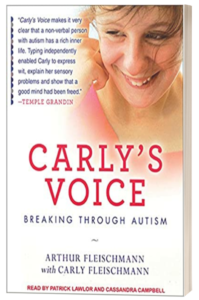This month’s book club is:
Carly’s Voice: Breaking Through Autism
-Arthur Fleischmann, Carly Fleischmann
Welcome to our Book Club! Thank you for voting on this month’s book. If you’d like to vote for next month’s book, please join my email list here.
“Carly’s voice makes it very clear that a non-verbal person with autism has a rich inner life. Typing independently enabled Carly to express wit, explain her sensory problems, and show that a good mind had been freed.”
That’s a quote by Temple Grandin about Carly. Let’s find out more about Carly.
Let’s get started on this great book written by someone who has non-speaking autism. I’m sure many of you want to understand your child a lot more, whether they’re speaking or not. This provides really great insight into a lot of different behaviors and thoughts. So let’s get to it.
Carly goes missing
At the beginning of the book, it says how the parents could not find their daughter, Carly, who has autism, and the parents were frantically looking for them. And so the parent ran to the park, you know, four or five blocks away. And there he says:
“As I rounded the corner, I saw a woman standing by her bicycle transfixed by a strange sight, a little girl. My little girl stood near the swing set. She was naked except for her sports samples, the dress she had been wearing sat in a ball on the ground.”
“Carly stood rigid limbed, making short, jerky, bowing movements from the waist like a short-circuiting robot.”
And so there was some relief for the parents. They found their child. However, there was an adult who was observing all this. They didn’t know what to do whatsoever.
And the book goes on to say “In one motion I picked up Carly’s dress and pulled it over her head with little hope it would have any impact on future flights, I told Carly, ‘You can’t just leave the house, Carly. You’ve scared me and you must keep your clothes on when we were outside.’ I wanted to say, ‘Stop this. Stop scaring the shit out of me. Stop creating havoc every five minutes. Stop being so needy. I love you, but stop.'” This is what the parent is thinking and so many of us have thought that, too.
But the parent did not say that. They went on to say, “But I didn’t.”
“Instead, I thanked the woman for staying with my daughter. She repeated that she didn’t know what to do or who to call. I could see she was happy to escape the situation.”
How many times have we been in a situation like that?
We still love our children. This is why this book is so important because it gives insights to both perspectives, to the parent’s perspective and also for the child.
Carly can outsmart her teacher?
This is when Carly was starting to work with some therapists. And if you’ve ever had a child who outsmarts people, but yet people still say they’re not that smart.
Please know, they’re very smart!
Let me just give you a little insight as to the situation that’s going on. This is an absolutely beautiful story here.
The therapist was saying she’s smart and the parents responded as follows: ‘”Aha.’ I responded, not wanting to dampen his enthusiasm.”
“We had seen the progress reports from school, Carly was beginning to point to letters on a letter board to spell words like cat or dog.”
“She was completing hundred piece jigsaw puzzles faster than an adult.”
“But the overall impression she gave with her hyperactivity, table slapping, and wailing, made it hard to see our daughter as intelligent.”
And so the therapist says, “No, really!!”
And he had to go out of the room for a second. There was another teacher there and the therapist said, “Just watch Carly for a second. I have to go in the hallway.”
And there was a bag of potato chips that this therapist was using as a reinforcer to get Carly to do things. Carly liked potato chips.
And as he was leaving, he turns to the teacher and says, “I put those on your desk.” meaning the potato chips. And she responds, “Howard, I’ve been teaching school for twenty-five years. I think I can keep Carly out of the chips for a minute.” The woman replied.
When Howard left the room, closing the split door behind him, Carly grabbed for the crumpled yellow bag of potato chips. The teacher was one step ahead of her and put it out of reach.
And so, having missed her chance, Carly saddled up to the desk, giving the woman what seemed to be a cuddle.
And how many times have we seen something like this happen?
And the teacher goes, “Oh, sweetieeee”. And she was assuming that Carly was, you know, being all affectionate. And so quickly, Carly attempted to reach around the teacher for the potato chips, but the teacher was one step ahead of her again and moved the chips out of Carly’s reach.
And now what is Carly to do?
Carly is smart, right?
So Carly picked up the teacher’s reading glasses and threw them across the room and the teacher jumped to go get her glasses and Carly got the potato chips.
So if your child’s doing any of these kinds of behaviors, but yet they’re not really communicating well, it’s possible for them to communicate so much more.
These are some of the early behaviors that Carly was showing and her therapist knew she was smart.
There were just a lot of obstacles to overcome. And it’s so true now.
Did Carly pull off a miracle?
Someone asked Carly a question and she responded to it in the book.
The question: “Carly, do you think what you are able to do is a miracle?”
And her reply through typing was:
“No. It took me a long time and a lot of hard work. Even before I spelled, I communicated with picture symbols and had a lot of therapy. It did not happen overnight. And I worked so hard to get to this point.”
And I know as a parent it can be really frustrating. Sometimes it feels like no progress is being made and some days are really frustrating for your child, too.
And you might be wondering, is it worth it? You know, is there intelligence there? Should I really push someone so hard? And, you know, I might be the only one who believes it.
And the answer is yes, keep going.
Keep looking for that answer, figuring out how your child can communicate. Because if they’re doing behaviors like outsmarting the teacher in a variety of different ways to get what they want, they’re that smart.
They are.
I’ve seen it time and time again with my clients. The children are smart. There are just certain obstacles for them to communicate. And once they have that avenue to communicate. Oh, my goodness, it is then so much fun. So much fun.
But as Carly says here, it was a lot of work. This didn’t happen overnight. So I know those days where you want to just give up and say, “Oh, this is just not going to happen.”
It’s okay to feel that way.
But then wake up the next morning and say, all right, we’re going to do this again.
Carly starts to hit on a guy!
Now here is a great conversation. There is a therapist, a teacher who is interacting with Carly. Carly is able to type.
And so Carly typed, “Is that woman your mother?”
And the teacher said, “How did you know that’s my mother?”
And Carly replies, “She looks like you.”
And then Carly types. “Who is that?” Pointing to a picture of a teenage boy who is shooting basketball in front of the house.
And the teacher replied, “That’s my son”
And Carly wrote, “He’s hot!”
And the teacher wasn’t quite sure. Okay, are you talking about his appearance, maybe body temperature? He was playing basketball and he’s hot, that kind of thing.
So Carly further went on to type, “Does he have a girlfriend?”
Oh, my goodness. Carly is a person with thoughts and feelings and curiosity and interests. Interest in boys.
And your child is the same way.
They ask her “Oh, where’s that coming from?”
But the teacher had an idea. She said, “Why not ask if Carly would like a weekly chat with her son who was at college, and then they could communicate more.”
Carly was obviously interested in this boy, so why not use that motivation? If you have ever seen any of my educational videos, you know, motivation is a great way to get children to be more educated, get children to show their competency more and more. So that’s what they did.
They set up a weekly online conversation.
And Carly started the conversation and she asked, “Why do you have a grocery cart in your room?”
And Brandon, this boy looks behind him and said, “Oh, my roommates and I use it to haul groceries and stuff.”
And then Carly (a person with autism who does not speak) asks, “Do you have a girlfriend?”
And he says, “Umm…Yeah.”
And so she replies, “That’s not good. Is she as cute as me?”
Well, how awesome is Carly? How spunky is she? How confident is she? Right. She’s basically hitting on this college boy without even speaking.
And when most people would actually question if there’s actually intelligence there and she’s super intelligent, super funny, super confident, like that’s a great young woman.
I’m just quoting all of this to you so that you get more understanding and insight into how someone who doesn’t speak can still be intelligent, can still have thoughts and feelings and depth, and be observant of things around them.
What does Carly hate?
And the last insight is here. I’ll just have a direct quote from Carly:
She says, “I hate when people ask me to do things that they already know I can or can’t do. Like, ask me to spell ‘chips’, for a chip.”
“It makes me feel like I am stupid.”
“Spell your name?” Good. Have a chip.
“‘Spell your name?’ You do not get it right. I guess you are not smart.”
“How does that make you feel?”
“My mom asked me a question that no one ever asks me, ‘what do I want?‘”
“I want not to feel what’s happening in my body. I want to stay at home. I want to be like every other kid.”
“I can’t sit for a long time or even walk past an object without having fights in my head. I know I can’t take the object, but my mind is fighting with me. I want to be able to go to a school with normal kids, but not have to worry about them getting upset or scared If I can’t help myself and I hit a table or scream!”
“I want to be able to read a book by myself without having to tell myself to sit still and not close the book and follow each word and concentrate.”
“I want to sit at a table with my mom and dad and not be worrying about what my body might do that I might not be able to control.”
“I want to be able to talk to people and have them understand me the first time, not re-spell over and over again. It’s too hard.”
And I’m sure your child wants very similar things. They want to express themselves. They want to be understood. They want to be educated. But for those who aren’t able to speak, it’s hard for them to get their wishes across.
So when you look at your child and you have that kind of gut feeling that they’re smart and they can do so much more and there’s so much potential and they want to do things, but it just sometimes doesn’t work out.
You are right.
Keep going in the direction that you’re going.
You’ll figure out what works best for them if you just keep moving forward.





